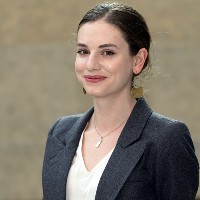Siobhan Angus

Professor Faculty of Public Affairs School of Journalism and Communication Ottawa, Ontario siobhan.angus@carleton.ca
Expert In
Media Relations
Bio/Research
Angus works at the intersections of art history, media studies, and the environmental humanities. Her award winning dissertation analyzed how photography and landscape painting chronicled, celebrated, and challenged the transformations enacted by extractive capitalism and settler colonialism on t...
Click to Expand >>
Click to Expand >>
Bio/Research
Angus works at the intersections of art history, media studies, and the environmental humanities. Her award winning dissertation analyzed how photography and landscape painting chronicled, celebrated, and challenged the transformations enacted by extractive capitalism and settler colonialism on the Canadian Shield.
Her book, Camera Geologica: An Elemental History of Photography, challenges the emphasis on immateriality in discourses on photography to tell a history of photography that is fundamentally material. Addressing the material links between image-making and resource extraction, the book shows how the mine is a precondition of photography, arguing, in turn, that photography begins underground. Centering histories of colonization, labor, and environmental degradation, Camera Geologica exposes the ways in which photography is enmeshed within—and enables—global extractive capitalism. Photography’s position of imbrication and complicity, the book argues, is relational and material. Exploring the materials of photography, then, is crucial as we attempt to make sense of the social, geopolitical, and economic systems that sustain our world. Reading materiality alongside representation and visual form, Camera Geologica reveals a complex picture of photography’s implication within extractive capitalism—and its potential to resist it.
She is currently working on two new projects that explore toxicity, environmental racism, and land relations in the Americas. The first project turns to petrochemical refining and the geographies of environmental racism in Cancer Alley and Chemical Valley. The second, a collaborative project with Jennifer Raab, focuses on the visual culture of the Salton Sea.
At Carleton, Angus teaches courses in visual culture studies and the environmental humanities, with a focus on collections-based research and experiential learning.
Click to Shrink <<
Her book, Camera Geologica: An Elemental History of Photography, challenges the emphasis on immateriality in discourses on photography to tell a history of photography that is fundamentally material. Addressing the material links between image-making and resource extraction, the book shows how the mine is a precondition of photography, arguing, in turn, that photography begins underground. Centering histories of colonization, labor, and environmental degradation, Camera Geologica exposes the ways in which photography is enmeshed within—and enables—global extractive capitalism. Photography’s position of imbrication and complicity, the book argues, is relational and material. Exploring the materials of photography, then, is crucial as we attempt to make sense of the social, geopolitical, and economic systems that sustain our world. Reading materiality alongside representation and visual form, Camera Geologica reveals a complex picture of photography’s implication within extractive capitalism—and its potential to resist it.
She is currently working on two new projects that explore toxicity, environmental racism, and land relations in the Americas. The first project turns to petrochemical refining and the geographies of environmental racism in Cancer Alley and Chemical Valley. The second, a collaborative project with Jennifer Raab, focuses on the visual culture of the Salton Sea.
At Carleton, Angus teaches courses in visual culture studies and the environmental humanities, with a focus on collections-based research and experiential learning.
Click to Shrink <<